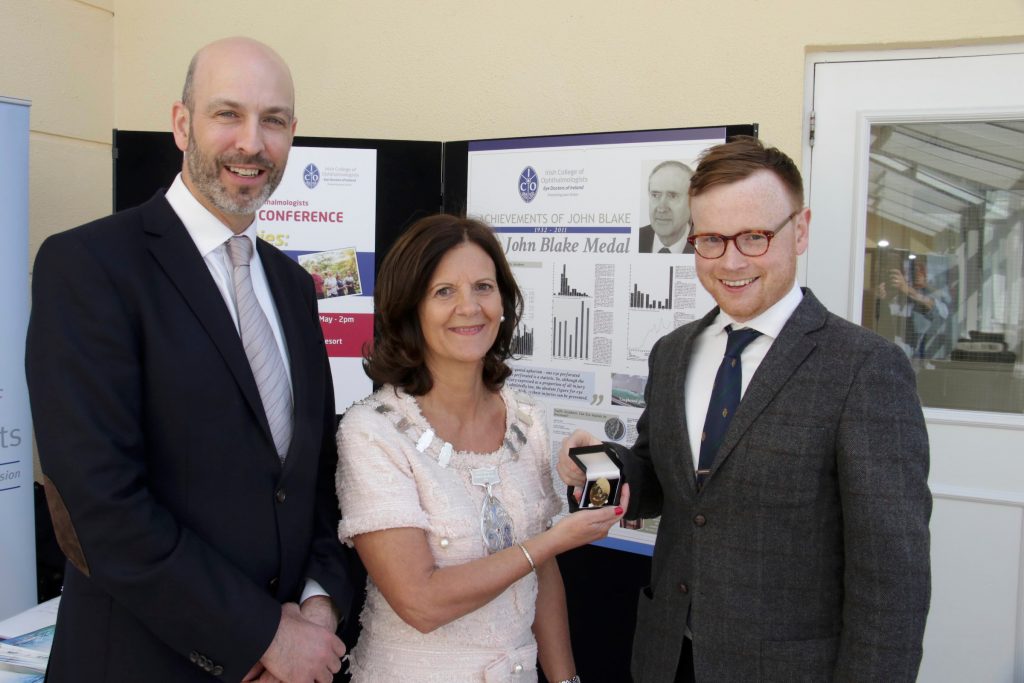Circadian variation in fluorescein signalling

Roibeard O’hEineachain
Published: Thursday, May 16, 2019
 ICO President Dr Alison Blake and Prof Conor Murphy present the inaugural John Blake Medal, named in honour of Dr Blake’s father, Consultant Ophthalmic Surgeon Mr John Blake, to Dr Alan Hopkins for the Best Scientific Laboratory Paper at the ICO Annual Conference 2019
Retinal blood-brain permeability appears to vary depending on the time of day, according to a study presented at the Irish College of Ophthalmology Annual Conference in Galway, Ireland.
“We have shown that in healthy volunteers undergoing fundus fluorescein angiography (FFA) there is a significant increase and more prolonged fluorescein signal in the evening compared to the morning,” said Alan Hopkins MD, Royal Victoria Eye and Ear Hospital, Dublin, Ireland.
The study involved 23 healthy human volunteers aged 18 to 30 who underwent quantitative in the morning and evening to assess for any changes in retinal vascular integrity. Fundal images were independently reviewed by a consultant ophthalmologist and Image +J analysis was used for quantification of FFA images.
The investigation showed that the fluorescein signal was more evident and more prolonged in the evening compared to the morning in the same subject and in all macular regions analysed (P < 0.001).
“An inner retina derived supply of systemically derived components to the photoreceptor outer segments and RPE has not been described previously and may represent a critically important physiological process central to the development of a range of retinopathies including age-related macular degeneration (AMD),” Dr Hopkins added.
ICO President Dr Alison Blake and Prof Conor Murphy present the inaugural John Blake Medal, named in honour of Dr Blake’s father, Consultant Ophthalmic Surgeon Mr John Blake, to Dr Alan Hopkins for the Best Scientific Laboratory Paper at the ICO Annual Conference 2019
Retinal blood-brain permeability appears to vary depending on the time of day, according to a study presented at the Irish College of Ophthalmology Annual Conference in Galway, Ireland.
“We have shown that in healthy volunteers undergoing fundus fluorescein angiography (FFA) there is a significant increase and more prolonged fluorescein signal in the evening compared to the morning,” said Alan Hopkins MD, Royal Victoria Eye and Ear Hospital, Dublin, Ireland.
The study involved 23 healthy human volunteers aged 18 to 30 who underwent quantitative in the morning and evening to assess for any changes in retinal vascular integrity. Fundal images were independently reviewed by a consultant ophthalmologist and Image +J analysis was used for quantification of FFA images.
The investigation showed that the fluorescein signal was more evident and more prolonged in the evening compared to the morning in the same subject and in all macular regions analysed (P < 0.001).
“An inner retina derived supply of systemically derived components to the photoreceptor outer segments and RPE has not been described previously and may represent a critically important physiological process central to the development of a range of retinopathies including age-related macular degeneration (AMD),” Dr Hopkins added.